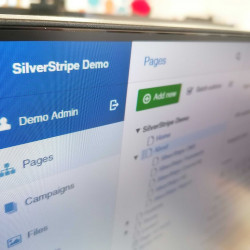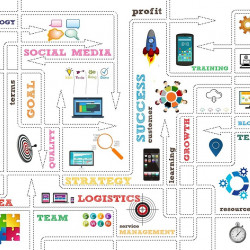You've probably come across cookies before - not the biscuits, but the little files of data used to help websites work better - but there have been concerns about tracking on the web.
This was part of the reasoning behind the cookie warnings that starting popping up everywhere a few years ago. It was following a change in EU legislation to make websites more transparent about the cookies they use.
What is a cookie?
A cookie is a little text file that contains data. It's controlled by the site that created it and typically used to track certain information. This could be anything, but it's often a unique ID, which, while it doesn't identify you directly, they tie up to information held in a database.
We use cookies on our website, called "Roseblade Session". There are others, but this one, in particular, is one we control. All this does is allows us to save certain data. For example, if you're a client of ours and you log in to our client area, we'll save this in our database against a unique ID, shown here as the content of the cookie.

When you go to another page, we know who you are, because the cookie links this back to you.
What's changing with cookies?
Do you ever feel like you're being followed online? You search for a product on Amazon or eBay, and suddenly it's shown to you on Facebook and many other websites you visit.
This is done with the help of cookies. It's called remarketing and is a key part of many business's marketing strategy, as you can target people who have shown an interest in your products or services.
By the end of 2021, Google Chrome will no longer allow advertising networks to place these cookies (sometimes referred to as tracking cookies) on your computer, so they can't track you as you move around the web.
You may be thinking, "But isn't Google's business model based on advertising?" You're spot on. It's part of their business model and a massive source of income for them.
Of course, Google isn't going to just remove this and let their entire business collapse under their feet. So although cookies are changing, personalised advertising isn't (really).
Introducing Federated Learning of Cohorts
That's a mouthful!
In short and in Google's words, it's "interest-based advertising on the web", but unlike now where you're linked to ads individually, you're linked as a group (or a cohort) of users, large enough to make you somewhat anonymous to the companies running the ads.
The longer explanation - Federated Learning of Cohorts (or FLoC for short), is a browser standard that aims to provide similar functionality but in a more private manner. It's being integrated into Google Chrome over the coming months.

How FLoC works
Whereas a cookie looks at you as an individual, FLoC looks at you as a group. So whereas a cookie would have an ID for example, which links you personally to data in a database, FLoC places you in a group (or cohort) with people with similar interests.
Your browser will be responsible for managing which cohort you're in, so a website will just be asking your browser what cohort you belong to.
The cohort itself will be decided based on your online activity, but can be based on specific websites you visit as well as the content on those pages.
When it comes to remarketing, companies can then tailor their targeting (and therefore, the ads) to your cohort, rather than to you individually (don't take that literally - we can't specifically say that we want Thomas Smith from Merthyr Tydfil to see this specific ad. It is a little bit more generic than that).
If you're really interested in the nitty-gritty details, check out the GitHub repo for FLoC.
Are all topics included?
It has been signalled that the likes of Chrome will wait until there are thousands of users interested in the same thing before a cohort is created. So those with very niche and specific interests, fear not - you should be safe!
Can I opt out?
If you're using Chrome you can find out if you're part of the trial by checking out the "Am I FLoCed" rel="noopener nofollow" website.
If you're included in the trial, you can opt out. As it's primarily for Google Chrome (for now at least), you need to take action in the browser (or change browser completely).
Simply blocking third party cookies should opt you out.
Are Firefox, Safari and Edge involved?
The FLoC concept is part of an open source project called Chromium, which Google Chrome, Opera and Microsoft Edge, to name a few, are built on. So the option is there.
However, The Verge reported that none of them, apart from Google Chrome itself, are rushing to implement this.
Time will tell with this one.
How private is it?
This is a key point around FLoC, and understandably so. The difference between FLoC and traditional tracking, is the onus of safety and security is put on the browser itself. That's a lot of weight to carry on your shoulders.
It can be argued that whereas before you were just a number in a pool of millions of users, FLoC means you're a number in a pool of a couple of thousand. Although I'm sure that if this is taken seriously, your privacy will be improved.
Where next?
It's worth remembering that FLoC is still a proposal and is being trialled. It doesn't instantly replace the existing setup so there's time for things to change and adapt.
From a marketing perspective, tools like Google Ads will probably remain largely the same, if not becoming a bit more in-depth. But again, time will tell.





